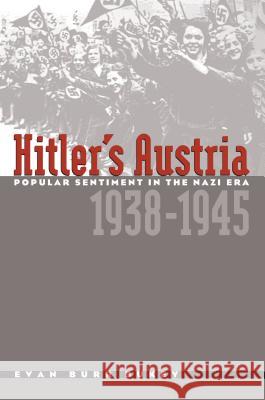Hitler's Austria: Popular Sentiment in the Nazi Era, 1938-1945 » książka
Hitler's Austria: Popular Sentiment in the Nazi Era, 1938-1945
ISBN-13: 9780807853634 / Angielski / Miękka / 2002 / 336 str.
Although Austrians comprised only 8 percent of the population of Hitler's Reich, they made up 14 percent of SS members and 40 percent of those involved in the Nazis' killing operations. This was no coincidence. Popular anti-Semitism was so powerful in Austria that once deportations of Jews began in 1941, the streets of Vienna were frequently lined with crowds of bystanders shouting their approval. Such scenes did not occur in Berlin.
Exploring the convictions behind these phenomena, Evan Bukey offers a detailed examination of popular opinion in Hitler's native country after the Anschluss (annexation) of 1938. He uses evidence gathered in Europe and the United States--including highly confidential reports of the Nazi Security Service--to dissect the reactions, views, and conduct of disparate political and social groups, most notably the Austrian Nazi Party, the industrial working class, the Catholic Church, and the farming community.
Sketching a nuanced and complex portrait of Austrian attitudes and behavior in the Nazi era, Bukey demonstrates that despite widespread dissent, discontent, and noncompliance, a majority of the Austrian populace supported the Anschluss regime until the bitter end, particularly in its economic and social policies and its actions against Jews.
"Excellent. . . . Warmly recommended for those experts on Austria recruited since the arrival of Haider's Freedom Party in Vienna's corridors of power.--Times Literary Supplement
"Even-handed, thoroughly documented, clearly written, and utterly fascinating. . . . An important and thought-provoking book.--Library Journal
"Now our best study on Austria's embrace of Nazism.--American Historical Review
"From a wealth of previously unknown archival sources, Bukey has put together a fair, conscientiously multifaceted though unsparingly frank picture of the Austrian people during the period of Nazi rule.--Historische Zeitschrift
Using evidence gathered in Europe and the United States, Evan Bukey crafts a nuanced portrait of popular opinion in Austria, Hitler's homeland, after the country was annexed by Germany in 1938. He demonstrates that despite widespread dissent, discontent, and noncompliance, a majority of the Austrian populace supported the Anschluss regime--particularly in its economic, social, and anti-Semitic policies--until the bitter end.
Evan Burr Bukey is professor of history at the University of Arkansas and author of Hitler's Hometown: Linz, Austria, 1908-1945.











